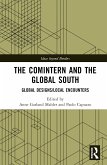- Gebundenes Buch
- Merkliste
- Auf die Merkliste
- Bewerten Bewerten
- Teilen
- Produkt teilen
- Produkterinnerung
- Produkterinnerung
The Global 1970s: Radicalism, Reform, and Crisis portrays the 1970s as a period of global transition and examines the explanations for this radical transformation. Divided into nine broadly chronological chapters and taking a global approach, it is essential reading for all students and scholars of twentieth-century global history.
Andere Kunden interessierten sich auch für
![The Comintern and the Global South The Comintern and the Global South]() The Comintern and the Global South167,99 €
The Comintern and the Global South167,99 €![The Dominicans in the Americas and the Philippines (c. 1500-c. 1820) The Dominicans in the Americas and the Philippines (c. 1500-c. 1820)]() The Dominicans in the Americas and the Philippines (c. 1500-c. 1820)163,99 €
The Dominicans in the Americas and the Philippines (c. 1500-c. 1820)163,99 €![Colonial Soldiers in Europe, 1914-1945 Colonial Soldiers in Europe, 1914-1945]() Colonial Soldiers in Europe, 1914-1945188,99 €
Colonial Soldiers in Europe, 1914-1945188,99 €![Global Dance Cultures in the 1970s and 1980s Global Dance Cultures in the 1970s and 1980s]() Global Dance Cultures in the 1970s and 1980s112,99 €
Global Dance Cultures in the 1970s and 1980s112,99 €![Global Dance Cultures in the 1970s and 1980s Global Dance Cultures in the 1970s and 1980s]() Global Dance Cultures in the 1970s and 1980s112,99 €
Global Dance Cultures in the 1970s and 1980s112,99 €![China, Hong Kong, and the Long 1970s: Global Perspectives China, Hong Kong, and the Long 1970s: Global Perspectives]() China, Hong Kong, and the Long 1970s: Global Perspectives75,99 €
China, Hong Kong, and the Long 1970s: Global Perspectives75,99 €![Staging Slavery Staging Slavery]() Staging Slavery157,99 €
Staging Slavery157,99 €-
-
-
The Global 1970s: Radicalism, Reform, and Crisis portrays the 1970s as a period of global transition and examines the explanations for this radical transformation. Divided into nine broadly chronological chapters and taking a global approach, it is essential reading for all students and scholars of twentieth-century global history.
Produktdetails
- Produktdetails
- Verlag: Routledge
- Seitenzahl: 256
- Erscheinungstermin: 7. August 2018
- Englisch
- Abmessung: 240mm x 161mm x 18mm
- Gewicht: 552g
- ISBN-13: 9780415737470
- ISBN-10: 0415737478
- Artikelnr.: 53606898
- Herstellerkennzeichnung
- Libri GmbH
- Europaallee 1
- 36244 Bad Hersfeld
- gpsr@libri.de
- Verlag: Routledge
- Seitenzahl: 256
- Erscheinungstermin: 7. August 2018
- Englisch
- Abmessung: 240mm x 161mm x 18mm
- Gewicht: 552g
- ISBN-13: 9780415737470
- ISBN-10: 0415737478
- Artikelnr.: 53606898
- Herstellerkennzeichnung
- Libri GmbH
- Europaallee 1
- 36244 Bad Hersfeld
- gpsr@libri.de
Duco Hellema studied political science at Leiden University, the Netherlands. In 1998, he was appointed Professor of the History of International Relations at the History Department of Utrecht University, the Netherlands. He has published widely on the history of post-World War II international relations and particularly on developments in the 1970s.
Foreword Introduction Chapter I: Legacies of the Sixties The Start of the
Long Seventies The Welfare State The Revolution that Failed The Tet
Offensive The Prague Spring and the Cultural Revolution Upheavals
Conclusion Chapter II: Everything is Political The Early and Mid-1970s
Prosperity Students Worker Militancy Emancipation The Environment Vietnam
Violence and Terrorism Conclusion Chapter III: Reform Mania The Early and
Mid-1970s 'A Mania for Large Scale Reforms' Southern Europe Britain and
France Nixon The State Western Divisions Conclusion Chapter IV:
Self-Reliance The Non-Western World in the Early and Mid-1970s
Self-Reliance Africa Latin America Asia Miracles of Growth The Middle East
The October War A New International Economic Order Conclusion Chapter V:
The Communist States The Early and Mid-1970s Détente The Soviet Union
Eastern Europe Soviet Expansion The Sino-Soviet Split Conclusion Chapter
VI: Crisis in the World Economy From the Early to the Late 1970s What
Crisis? Monetary Problems Globalization The Oil Crisis Unemployment
Fighting the Crisis The Non-Western World The Communist States Conclusion
Chapter VII: The Free Market Alternative The Mid- and Late 1970s The Me
Decade Self-Help and Identity Politics The Great Awakening The New Right
Grass-Roots Mobilization Neoliberalism and Supply-Side Economics Human
Rights Neoliberal Experiments The Newly Industrializing Countries
Conclusion Chapter VIII: Confrontation and Deadlock The Late 1970s
Deadlock Watergate Carter A German Autumn Governing Western Europe The
Winter of Discontent Southern Europe Eurosclerosis Debts and Violence in
the Third World Charter 77 Conclusion Chapter IX: Dawn of a New World The
End of the Seventies The Personal Computer Revolution in Iran The Second
Oil Crisis The Lady's not for Turning Reagan's Second American Revolution
Western Europe Weakening Left The Second Cold War Solidarnosc The End of
the Third World Deng Xiaoping Conclusion Post-Script The End of Progress?
Literature
Long Seventies The Welfare State The Revolution that Failed The Tet
Offensive The Prague Spring and the Cultural Revolution Upheavals
Conclusion Chapter II: Everything is Political The Early and Mid-1970s
Prosperity Students Worker Militancy Emancipation The Environment Vietnam
Violence and Terrorism Conclusion Chapter III: Reform Mania The Early and
Mid-1970s 'A Mania for Large Scale Reforms' Southern Europe Britain and
France Nixon The State Western Divisions Conclusion Chapter IV:
Self-Reliance The Non-Western World in the Early and Mid-1970s
Self-Reliance Africa Latin America Asia Miracles of Growth The Middle East
The October War A New International Economic Order Conclusion Chapter V:
The Communist States The Early and Mid-1970s Détente The Soviet Union
Eastern Europe Soviet Expansion The Sino-Soviet Split Conclusion Chapter
VI: Crisis in the World Economy From the Early to the Late 1970s What
Crisis? Monetary Problems Globalization The Oil Crisis Unemployment
Fighting the Crisis The Non-Western World The Communist States Conclusion
Chapter VII: The Free Market Alternative The Mid- and Late 1970s The Me
Decade Self-Help and Identity Politics The Great Awakening The New Right
Grass-Roots Mobilization Neoliberalism and Supply-Side Economics Human
Rights Neoliberal Experiments The Newly Industrializing Countries
Conclusion Chapter VIII: Confrontation and Deadlock The Late 1970s
Deadlock Watergate Carter A German Autumn Governing Western Europe The
Winter of Discontent Southern Europe Eurosclerosis Debts and Violence in
the Third World Charter 77 Conclusion Chapter IX: Dawn of a New World The
End of the Seventies The Personal Computer Revolution in Iran The Second
Oil Crisis The Lady's not for Turning Reagan's Second American Revolution
Western Europe Weakening Left The Second Cold War Solidarnosc The End of
the Third World Deng Xiaoping Conclusion Post-Script The End of Progress?
Literature
Foreword Introduction Chapter I: Legacies of the Sixties The Start of the
Long Seventies The Welfare State The Revolution that Failed The Tet
Offensive The Prague Spring and the Cultural Revolution Upheavals
Conclusion Chapter II: Everything is Political The Early and Mid-1970s
Prosperity Students Worker Militancy Emancipation The Environment Vietnam
Violence and Terrorism Conclusion Chapter III: Reform Mania The Early and
Mid-1970s 'A Mania for Large Scale Reforms' Southern Europe Britain and
France Nixon The State Western Divisions Conclusion Chapter IV:
Self-Reliance The Non-Western World in the Early and Mid-1970s
Self-Reliance Africa Latin America Asia Miracles of Growth The Middle East
The October War A New International Economic Order Conclusion Chapter V:
The Communist States The Early and Mid-1970s Détente The Soviet Union
Eastern Europe Soviet Expansion The Sino-Soviet Split Conclusion Chapter
VI: Crisis in the World Economy From the Early to the Late 1970s What
Crisis? Monetary Problems Globalization The Oil Crisis Unemployment
Fighting the Crisis The Non-Western World The Communist States Conclusion
Chapter VII: The Free Market Alternative The Mid- and Late 1970s The Me
Decade Self-Help and Identity Politics The Great Awakening The New Right
Grass-Roots Mobilization Neoliberalism and Supply-Side Economics Human
Rights Neoliberal Experiments The Newly Industrializing Countries
Conclusion Chapter VIII: Confrontation and Deadlock The Late 1970s
Deadlock Watergate Carter A German Autumn Governing Western Europe The
Winter of Discontent Southern Europe Eurosclerosis Debts and Violence in
the Third World Charter 77 Conclusion Chapter IX: Dawn of a New World The
End of the Seventies The Personal Computer Revolution in Iran The Second
Oil Crisis The Lady's not for Turning Reagan's Second American Revolution
Western Europe Weakening Left The Second Cold War Solidarnosc The End of
the Third World Deng Xiaoping Conclusion Post-Script The End of Progress?
Literature
Long Seventies The Welfare State The Revolution that Failed The Tet
Offensive The Prague Spring and the Cultural Revolution Upheavals
Conclusion Chapter II: Everything is Political The Early and Mid-1970s
Prosperity Students Worker Militancy Emancipation The Environment Vietnam
Violence and Terrorism Conclusion Chapter III: Reform Mania The Early and
Mid-1970s 'A Mania for Large Scale Reforms' Southern Europe Britain and
France Nixon The State Western Divisions Conclusion Chapter IV:
Self-Reliance The Non-Western World in the Early and Mid-1970s
Self-Reliance Africa Latin America Asia Miracles of Growth The Middle East
The October War A New International Economic Order Conclusion Chapter V:
The Communist States The Early and Mid-1970s Détente The Soviet Union
Eastern Europe Soviet Expansion The Sino-Soviet Split Conclusion Chapter
VI: Crisis in the World Economy From the Early to the Late 1970s What
Crisis? Monetary Problems Globalization The Oil Crisis Unemployment
Fighting the Crisis The Non-Western World The Communist States Conclusion
Chapter VII: The Free Market Alternative The Mid- and Late 1970s The Me
Decade Self-Help and Identity Politics The Great Awakening The New Right
Grass-Roots Mobilization Neoliberalism and Supply-Side Economics Human
Rights Neoliberal Experiments The Newly Industrializing Countries
Conclusion Chapter VIII: Confrontation and Deadlock The Late 1970s
Deadlock Watergate Carter A German Autumn Governing Western Europe The
Winter of Discontent Southern Europe Eurosclerosis Debts and Violence in
the Third World Charter 77 Conclusion Chapter IX: Dawn of a New World The
End of the Seventies The Personal Computer Revolution in Iran The Second
Oil Crisis The Lady's not for Turning Reagan's Second American Revolution
Western Europe Weakening Left The Second Cold War Solidarnosc The End of
the Third World Deng Xiaoping Conclusion Post-Script The End of Progress?
Literature









